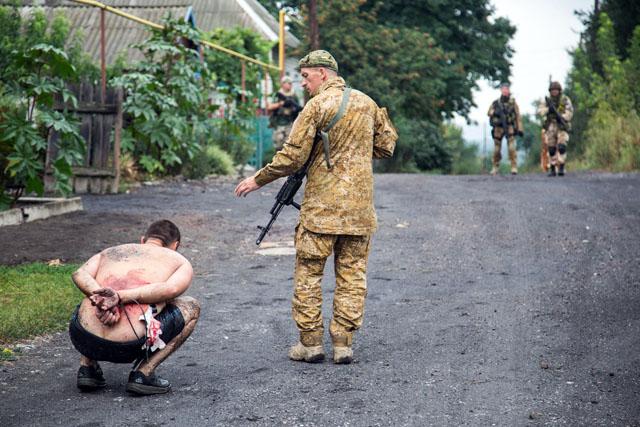You are here
Ukraine says Russia withdrawing forces from east, sees boost for peace
By Reuters - Sep 10,2014 - Last updated at Sep 10,2014
KIEV — Ukraine's president said on Wednesday Russia had removed the bulk of its forces from his country, raising hopes for a peace drive now under way after five months of conflict in which more than 3,000 people have been killed.
Moscow denies sending troops into eastern Ukraine to support pro-Russian rebels battling Ukrainian forces, despite what Kiev and its Western backers say is overwhelming evidence to the contrary. Moscow also denies arming the separatists.
President Petro Poroshenko told a televised Cabinet meeting Ukraine would remain a sovereign, united country under the terms of a peace roadmap approved last Friday, but said parts of the east under rebel control would get special status.
"According to the latest information I have received from our intelligence, 70 per cent of Russian troops have been moved back across the border," he said. "This further strengthens our hope that the peace initiatives have good prospects."
However, Poroshenko said the ceasefire was not proving easy to maintain because "terrorists" were constantly trying to provoke Kiev's forces.
Ukraine's military recorded at least six violations of the ceasefire overnight but said there were no casualties. Five servicemen have been killed during the ceasefire, Ukraine says. A civilian was also killed at the weekend during shelling of the eastern Port of Mariupol on the Sea of Azov in eastern Ukraine.
Poroshenko said Ukraine was regrouping its forces in eastern Ukraine, not in preparation for a new offensive against the rebels, as the separatists themselves have suggested, but in order to defend territory from possible attack.
The Kremlin said Russian President Vladimir Putin and Poroshenko were broadly satisfied with how the ceasefire, in place for nearly five days, was holding in Ukraine. The two leaders spoke by phone on Tuesday for the second time this week.
Olive branch
In his televised remarks, Poroshenko offered the rebels an olive branch by saying he would propose a bill next week offering "special status" to parts of the Donetsk and Luhansk regions of eastern Ukraine they now control.
But he was adamant in rejecting the separatists' demands for full independence for their regions and the kind of radical "federalisation" favoured by Russia.
"The Minsk protocol envisages the restoration and preservation of Ukrainian sovereignty on all the territory of the Donbass [in eastern Ukraine], including that controlled by the fighters," Poroshenko said.
City authorities in Mariupol, a key frontline in the conflict, announced on Wednesday tough new security measures including a night-time curfew to help control rebel movements.
Underlining the complexity of the conflict, armed Chechen fighters in the eastern city of Dnipropetrovsk told Reuters they had come to Ukraine to take revenge on "Russian invaders" who they said had destroyed their own North Caucasus homeland.
"They [the Russians] took everything from us, I had to bury all my relatives, my daughter... We are here now on a mission to save Ukraine," said their commander, Isa Munayev, who said he now had a Danish passport.
Russia waged two wars in the 1990s against separatists in Chechnya, a small, mainly Muslim republic in the North Caucasus. But other Chechens, loyal to the region's current pro-Moscow ruler, are now fighting in Ukraine on the rebels' side
The conflict in Ukraine has plunged relations between Russia and the West to their lowest point since the Cold War.
Putin accused NATO on Wednesday of using the Ukraine crisis to "resuscitate itself". He also signed a decree taking direct charge of a commission that oversees Russia's defence industry as Moscow tries to reduce reliance on Western equipment.
At a summit last week in Wales, NATO pledged support for non-member Ukraine in its efforts to tackle the separatist rebellion and announced plans to beef up the defence of alliance members in eastern Europe, including the Baltic republics.
The European Union and United States have imposed economic sanctions against Russia over its role in Ukraine, prompting Moscow to retaliate by banning most Western food imports.
The EU has prepared another wave of sanctions targeting Russia's banking and energy sectors but has held off implementing them to see whether the ceasefire holds.
German Chancellor Angela Merkel, the EU's most powerful leader, said in Berlin that the 28-nation bloc should go ahead with the new sanctions, adding it could always suspend them later if there was progress towards a durable peace in Ukraine.
Poroshenko signed a law on Wednesday allowing Ukraine to impose its own sanctions against Russian firms and individuals deemed to be backing the separatists in eastern Ukraine.
In Prague, the Organisation for Security and Cooperation in Europe (OSCE), which is monitoring the ceasefire, said it would be reasonable to allow more time for the peace process before imposing more sanctions against Russia.
Didier Burkhalter, who is president of Switzerland, said the OSCE would soon deploy drones to monitor the ceasefire.
Human rights group Amnesty International said in Moscow it had documented evidence of war crimes by both sides and also repeated criticism of Russia's role in the conflict.
Related Articles
After months of ratcheting up pressure on Vladimir Putin, concern is mounting in Berlin and other European capitals that an emboldened Ukraine's military successes in the east are reducing the chances of a face-saving way out of the crisis for the Russian leader.
Ukraine marked its independence day on Sunday with a military march-past in Kiev intended to send a message of defiance to Russia, but pro-Moscow rebels countered by parading captured Ukrainian troops through the streets of their main stronghold.
BRUSSELS/WASHINGTON — Russia's air strikes in Syria are in part designed to extract concessions from the West over Ukraine by making Moscow

















